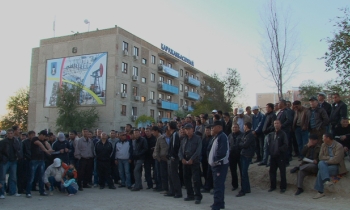May 24, 2007 - According to a Pew Research Center poll released earlier this week, Muslim-Americans are “largely assimilated, happy with their lives, and moderate with respect to many of the issues that have divided Muslims and Westerners around the world.” The poll showed the majority surveyed have close non-Muslim friends, believe in a strong American work ethic and feel there is little conflict between being a devout Muslim and living in a modern society. Overall, an encouraging picture, right?
Not according to a cavalcade of major media outlets. On Tuesday and Wednesday, coverage of the poll was downright foreboding. “Supporting Terror?” read the CNN crawl at the bottom of the screen as John Roberts interviewed a group of young moderate Muslims about the poll. On CBS News online, the headline incorrectly stated that 26% OF YOUNG U.S. MUSLIMS OK BOMBS. And in USA Today, more misinformation and scare tactics: POLL: 1 IN 4 YOUNGER U.S. MUSLIMS SUPPORT SUICIDE BOMBINGS.
The fear-inducing reports were based on the responses to a couple of questions in the Pew survey: is suicide bombing justified? The outcome: “Very few Muslim Americans—just 1%—say that suicide bombings against civilian targets are often justified to defend Islam; an additional 7% say suicide bombings are sometimes justified in these circumstances,” according to the Pew poll. As for U.S. Muslims under 30, Pew reported that 15 percent believe suicide bombings can be often or sometimes justified. The numbers were tucked inside a 108-page report that also found a large majority of U.S. Muslims rejected the idea of violence against civilians, had very unfavorable views of Al Qaeda and were concerned about the rise of Muslim extremism in the United States.
So why, amid all the other encouraging data, would such a large number of media outlets mine the poll for evidence that Muslims—even the ones next door—are dangerous? Hussein Ibish, executive director of the Foundation for Arab American Leadership, says the answer is as disturbing as it is predictable. “It suggests there is an appetite for negativity about U.S. Muslims in the American media,” he says. “There’s two templates post-9/11 for coverage about American Muslims. One is they are scary—be very afraid. The other template is the sorry, poor pathetic victims of hate crimes. It’s villain or victim—a ridiculous set of choices—and coverage of this poll has fallen into the villain category. It’s irrational, because if you read the poll, it is actually quite positive.”
Yasmin Hamidi, 26, was one of the three young Muslim-Americans interviewed on CNN last Tuesday. “I didn’t see the graphics on the screen until I watched it online,” she says. “I thought, ‘Are you kidding me?’ It was so irresponsible that they put “Supporting Terror?” on the bottom while we’re speaking. Two Columbia Ph.D. students and someone who works full time at an interreligious-understanding NGO—I mean, come on! It’s not surprising, but it’s still upsetting to see.”
Since the 9/11 attacks, U.S. Muslims like Hamidi have become accustomed to gritting their teeth while watching pundits on cable news or reading the paper. The 2001 attacks, the war in Iraq and the babblings of warped political figures like Iranian President Mahmoud Ahmadinejad have come to stand for Islam and its followers in the most negative terms. For many Americans, coverage of these issues is the only exposure to the Muslim world they get. Yet surely the media has a responsibility to present the whole picture—the good and the bad—rather than just the titillating, scary bits that help drive higher ratings.
Still, despite the fact that U.S. Muslims are far more assimilated than those in Europe, many large media outlets never let us forget that American Muslims are still a potentially dangerous group. The Pew poll is simply our latest reminder. “There’s absolutely no basis in the poll for concluding it’s a radicalized community,” says Ibish. “I can almost guarantee that the overwhelming majority who were asked the suicide-bombing question were thinking about Palestine—not Iraq or America. They’re not willing to say it’s never OK because they think Palestinians have no other options. They’re wrong, but that’s what they think. It’s exactly the same kind of statistic you’d get if you asked young Israelis about torture, demolition of villages, assassinations—they’d say yes because they know the Israelis have done it but loathe to say it’s wrong. I’m sure, knowing the Muslim community, that if you resolved the occupation in Palestine, that number would go very close to zero.”
Some media outlets also focused on the unusually high percentage of American Muslims (28 percent) who still don’t believe that the perpetrators of the 9/11 attacks were Arabs—a result that I, too, find baffling. Still, the overall coverage of the Pew poll was way out of whack. It’s no wonder that when the pollsters asked U.S. Muslims how they felt about American news coverage of their faith and its followers, 57 percent said they felt is was unfair. It’s unlikely that number will make headlines anytime soon.









